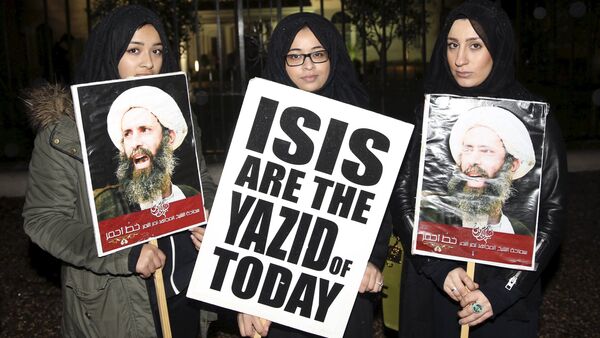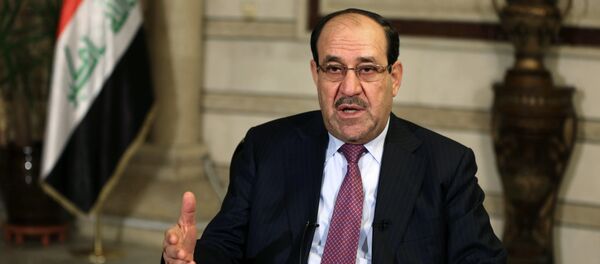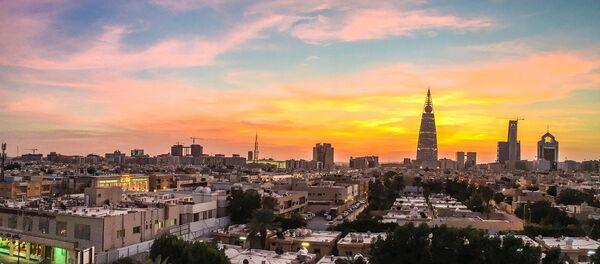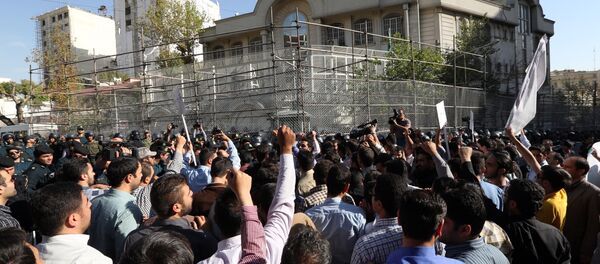The execution of a prominent Shiite cleric, one of the 47 people killed on Saturday in what comes as Saudi Arabia’s biggest mass execution in decades, has stirred real anger in the region.
#Shia's protest 2day at #Lahore Press Club against #SheikhNimr execution in #SaudiArabia pic.twitter.com/EeYGWNXZKC
— Samiullah Randhawa (@sami_randhawa) 3 января 2016
The most vocal critic of the kingdom was its Shi'ite rival to the north, Iran. Iran's Supreme Leader Ayatollah Khamenei warned Saudi Arabia on Sunday of imminent divine revenge.
Photos of protests in front of Saudi Arabia counsulate in Mashad following #Nimr execution. https://t.co/K2ydeOQyAm pic.twitter.com/37OqI5EpBh
— varujean avanessian (@pandagulu) 2 января 2016
"Doubtlessly, the unfairly-spilled blood of oppressed martyr Sheikh Nimr will affect rapidly and Divine revenge will seize Saudi politicians," Iran’s Shiite spiritual leader warned the Sunni-ruled monarchy on Twitter.
Doubtlessly, unfairly-spilled blood of oppressed martyr #SheikhNimr will affect rapidly & Divine revenge will seize Saudi politicians.
— Khamenei.ir (@khamenei_ir) 3 января 2016
A former prime minister of another neighbor of the kingdom, Iraq, Nouri al-Maliki condemned the execution, pledging that the act would bring down the Saudi rulers.
The US has expressed concern, warning that it may provoke sectarian violence.
"We are particularly concerned that the execution of prominent Shia cleric and political activist Nimr al-Nimr risks exacerbating sectarian tensions at a time when they urgently need to be reduced," Kirby said in a statement late Saturday.
Kirby said Washington has "frequently" raised concerns about the legal process in Saudi Arabia at high-level meetings, and urged Riyadh to permit the peaceful expression of dissent. He added that the Saudi government needs to work with community leaders to defuse tensions in the wake of the executions.
EU foreign policy chief Federica Mogherini said on Saturday that the specific case of Sheikh Nimr raises serious concern about freedom of expression and the respect of basic civil and political rights “also in the framework of the fight against terrorism.”
She warned that the case has the potential of sparking “further the sectarian tensions that already bring so much damage to the entire region, with dangerous consequences.”
German officials have expressed concern over the further mounting of tensions in the region.
“The execution of Nimr al-Nimr strengthens our existing concerns about increasing tensions and deepening rifts in the region,” the German media quotes a German Foreign Ministry official, without revealing his name, as saying on Saturday, hours after Riyadh announced the execution of Sheikh Nimr along with 46 others for terrorism-related charges.
Human Rights Watch and one British human rights defender condemned the executions, describing them as “the most serious crime imaginable”.
The European Centre for Democracy and Human Rights (ECDHR), Americans for Democracy and Human Rights in Bahrain (ADHRB) and the Bahrain Institute for Rights and Democracy (BIRD) released a joint statement which says they condemn the Saudi government’s actions in the “strongest and most absolute terms”. It also calls on the international community “to intervene in order to prevent any further bloodshed”.
#Shia community protests in #Karachi #Pakistan against execution of #SheikhNimr by #SaudiArabia… #NimrBloodEndsKSA pic.twitter.com/US30FVlZTi
— Bilal Farooqi (@bilalfqi) 2 января 2016
Late on Saturday, violent protests broke out in Iran, Bahrain, Shia areas of Saudi Arabia, Indian-controlled Kashmir and Pakistan.
Nimr's execution would mark the start of a new wave of protests in Saudi Arabia. #NimrBloodEndsKSA pic.twitter.com/XKcjb45oXf
— Hussain Rehber (@hussain_rehber) 2 января 2016
The simultaneous execution of 47 people — 45 Saudis, one Egyptian and a man from Chad — was the biggest mass execution for security offences in Saudi Arabia since the 1980 killing of 63 jihadist rebels who seized Mecca's Grand Mosque in 1979.
Most of the 47, 43, were Sunnis convicted of al Qaeda attacks in Saudi Arabia a decade ago. Four, including Nimr, were Shi'ites accused of involvement in the shooting of policemen.
The executions took place in 12 cities; four prisons used firing squads and the others beheaded the convicts.






